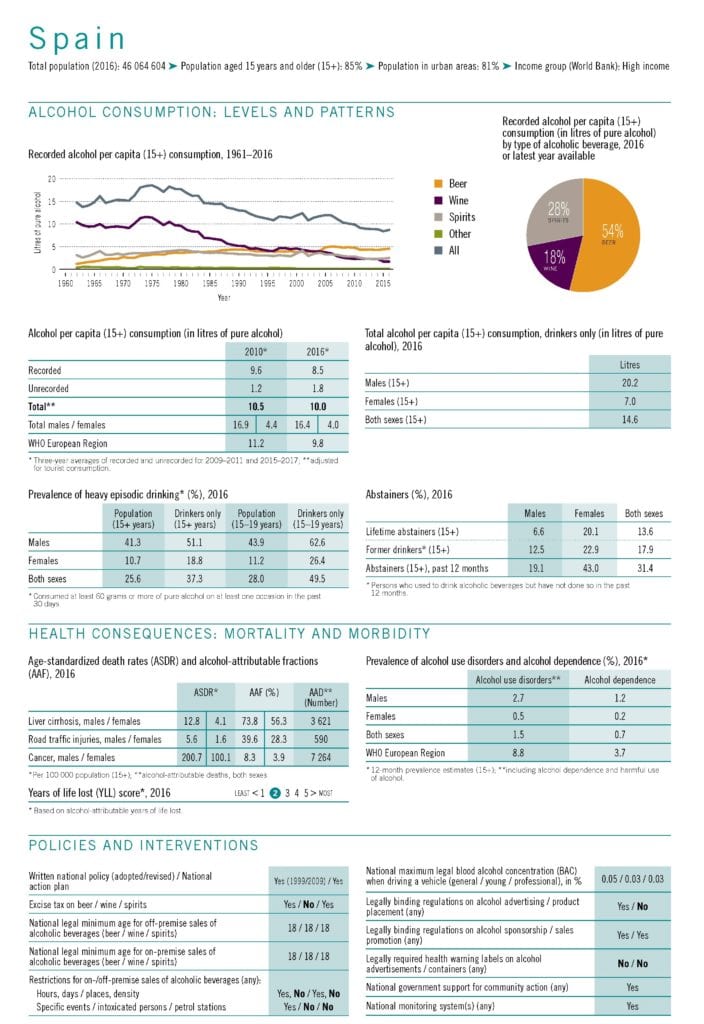Good governance means prioritizing the health and well-being of people and communities. Spain is doing so by taking several actions to lower alcohol availability and thus better prevent alcohol harm in the country.
National action to lower alcohol availability
Cardiovascular diseases are the leading cause of death and the second leading cause of hospitalizations in Spain. In 2019, cardiovascular diseases affected 9.8% of the population. In light of this, the Spanish Ministry of Health launched the Strategy for Cardiovascular Health. The Inter-territorial Council of the National Health System (ESCAV) approved the strategy on April 27, 2022.
The strategy proposes addressing risk factors of cardiovascular disease, such as alcohol consumption with a comprehensive approach.
Measures included in the strategy are:
- Education,
- Training and health promotion,
- Early diagnosis,
- Prevention, and
- Rehabilitation.
The strategy incorporates key aspects, such as knowledge management, research, and technological innovation with a focus on equity.
The proposed measures in the strategy to lower alcohol consumption and harm include the following:
- Collaborating with restaurants to promote the Mediterranean diet as a model of heart-healthy eating without including alcohol consumption.
- Instead of alcohol, the Spanish government wants restaurants to promote water by including tap water by default on the menus.
In another plan to lower alcohol availability, the Spanish government wants to limit alcohol products offered in cafeterias, vending machines, and snack dispensers in public administration buildings and educational facilities.
Alcohol policy action on the Balearic islands
Meanwhile, regional governments in Mallorca – the largest island in the Balearic archipelago – and other parts of the archipelago have banned all-inclusive alcohol aiming to lower alcohol use and better prevent alcohol harm.
Magaluf and El Arenal on Mallorca and Ibiza have adopted this new policy.
Furthermore, under the improved regulations happy hours, pub crawls, and two-for-one alcoholic beverages will also be banned in these jurisdictions.
Alcohol harm and alcohol policy in Spain
As the World Health Organization reports, in 2016, the total per capita alcohol consumption in Spain is 10 liters. This is above the average of the WHO European region. Almost half (49.5%) of the young people between 15 to 19 years of age who use alcohol engage in binge consumption.
In Spain in 2016 alcohol caused:
- 3621 deaths due to liver cirrhosis,
- 590 deaths due to road traffic accidents, and
- 7254 deaths due to cancer.
Considering this alcohol burden affecting the people of Spain the new measures for lowering alcohol availability that will be taken by the Spanish government and regional governments will benefit heart health in particular and the prevention of multiple alcohol harms in general.
Sources
Spanish News Today: “Spain plans to limit alcohol consumption in restaurants by promoting water“
Ministry of Health, Spain: “The Interterritorial Council of the National Health System approves the Cardiovascular Health Strategy (ESCAV)“
Express: “Spain all-inclusive alcohol ban – full list of affected areas in Majorca and Balearics”
